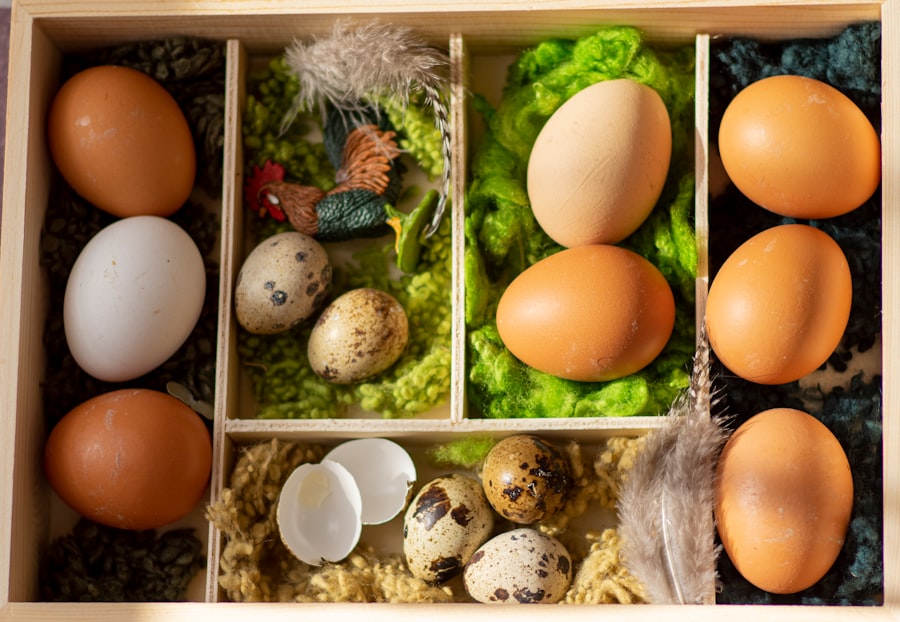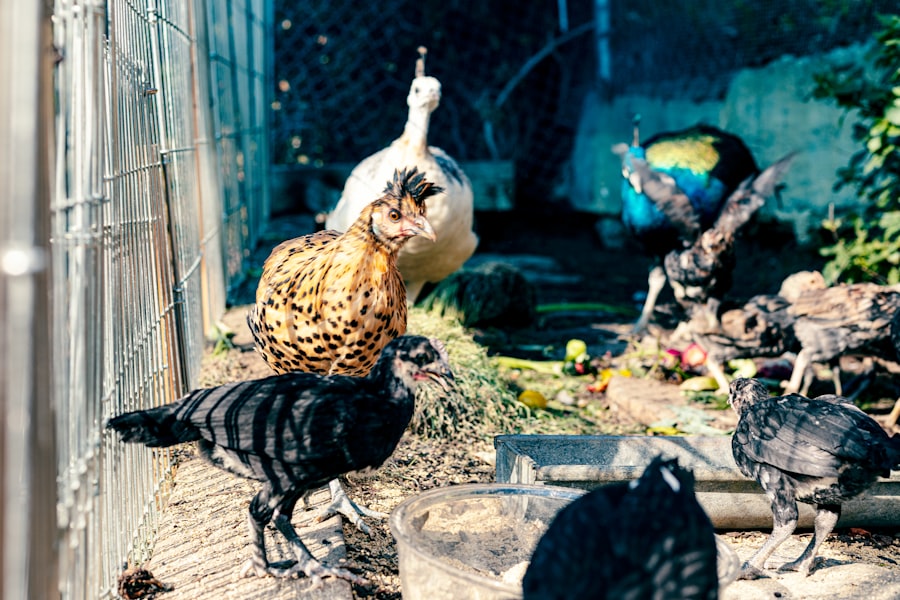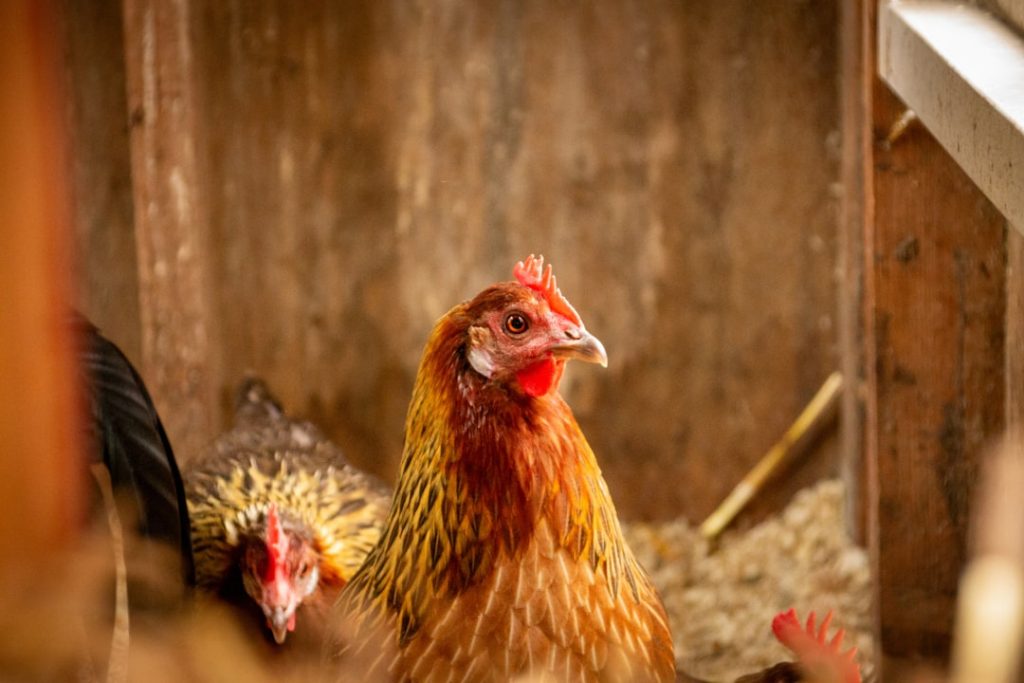When selecting a chicken breed for a backyard coop, several factors should be considered. Climate is a crucial aspect, as some breeds are better adapted to cold weather, while others thrive in warmer conditions. The intended purpose of raising chickens is also important, whether for egg production, meat, or dual-purpose use.
Each breed has specific characteristics that make it suitable for different purposes. For egg production, breeds like Rhode Island Red or Leghorn are popular choices. Meat birds often include Cornish Cross or Freedom Ranger breeds.
Temperament is another consideration, with some breeds known for being docile and friendly, such as Orpingtons or Sussex, which may be preferable for families with children or those who plan to handle the chickens frequently. Space availability is also a factor, as some breeds are better suited for free-ranging, while others adapt well to confined spaces. The availability of the breed in the local area should be taken into account to ensure easy access to chicks or adult birds when starting or expanding a flock.
Health and disease resistance are important considerations, with some breeds known for their hardiness and resistance to common poultry diseases. Choosing a breed with a good reputation for health can contribute to the long-term success and well-being of the flock. Lastly, while not the most critical factor, the appearance of the breed can add enjoyment to chicken-keeping.
There are numerous breeds with diverse feather colors, patterns, and shapes, allowing keepers to select birds that appeal to their aesthetic preferences.
Table of Contents
Key Takeaways
- Consider the climate, space, and purpose when choosing the right breed of chicken for your coop.
- When building a coop, ensure it is secure, well-ventilated, and has enough space for the number of chickens you plan to keep.
- Provide a balanced diet and clean water for your chickens to ensure their health and productivity.
- Regularly clean the coop, check for signs of illness, and provide proper grooming and healthcare for your chickens.
- Protect your chickens from predators by securing the coop with sturdy fencing and using deterrents such as motion-activated lights or sound devices.
- Handle and socialize your chickens regularly to keep them tame and friendly towards humans.
- Schedule regular check-ups with a veterinarian and be prepared to address any health issues that may arise with your chickens.
Building a Coop
Size and Space Considerations
When designing and constructing a coop, it’s essential to consider the size of your flock and how much space they will need. Chickens require a certain amount of space to move around comfortably, roost, and lay eggs. As a general rule of thumb, allow at least 2-3 square feet of space per bird inside the coop, and 8-10 square feet per bird in an outdoor run.
Coop Design and Layout
The coop should include areas for roosting, nesting boxes for laying eggs, and easy access for cleaning and maintenance. The coop should also provide protection from predators and the elements, with secure doors and windows that can be opened for ventilation. Additionally, consider the layout and design of the coop to ensure it meets the needs of your flock.
Materials and Construction
When it comes to materials, choose durable and weather-resistant options that will stand up to the elements and provide insulation from heat and cold. Pressure-treated lumber, plywood, and metal roofing are popular choices for coop construction. Additionally, consider adding insulation and proper ventilation to regulate temperature and moisture levels inside the coop. This will help keep your chickens comfortable and healthy throughout the year.
Location and Placement
Finally, think about the location of the coop on your property. It should be situated in an area that is well-drained and provides easy access for cleaning and maintenance. Consider placing the coop in a spot that receives plenty of natural light during the day, but also offers some shade to protect your chickens from excessive heat. By carefully considering these factors and taking the time to plan and build a well-designed coop, you can create a safe and comfortable home for your flock.
Feeding and Watering

Proper feeding and watering are essential aspects of caring for your backyard chickens. When it comes to feeding, it’s important to provide a balanced diet that meets all of your chickens’ nutritional needs. A good quality commercial feed formulated specifically for chickens is a great starting point.
Look for feeds that are appropriate for your chickens’ age and purpose (e.g., starter feed for chicks, layer feed for hens). Additionally, consider supplementing their diet with treats like fruits, vegetables, mealworms, or kitchen scraps to provide variety and additional nutrients. It’s important to monitor their intake and adjust their feed as needed based on their activity level, age, and overall health.
In addition to feeding, providing clean and fresh water is crucial for your chickens’ health and well-being. Make sure they have access to clean water at all times, especially during hot weather when they need to stay hydrated. Consider using a waterer that is designed specifically for chickens to prevent spills and contamination.
In colder climates, take steps to prevent water from freezing by using heated waterers or regularly replacing frozen water with fresh water. By paying close attention to their feeding and watering needs, you can help ensure that your chickens stay healthy and happy.
Providing Proper Care and Maintenance
Caring for backyard chickens involves regular maintenance tasks to keep them healthy and comfortable. One important aspect of care is keeping their living environment clean and sanitary. Regularly clean out their coop by removing soiled bedding, droppings, and debris.
Replace bedding as needed to maintain a dry and comfortable living space for your flock. Additionally, regularly clean their waterers and feeders to prevent contamination and ensure that they have access to clean food and water at all times. Another important aspect of care is monitoring their health and behavior on a regular basis.
Keep an eye out for any signs of illness or injury, such as changes in appetite, lethargy, abnormal droppings, or unusual behavior. By regularly observing your chickens and being familiar with their normal behavior, you can quickly identify any potential health issues and take appropriate action. Regularly grooming your chickens is also an important part of care and maintenance.
This includes checking them for parasites like lice or mites, trimming their nails if needed, and inspecting their feathers for any signs of damage or matting. By providing proper care and maintenance on a regular basis, you can help ensure that your chickens stay healthy and comfortable.
Protecting from Predators
Protecting your backyard chickens from predators is essential for their safety and well-being. There are several common predators that pose a threat to chickens, including raccoons, foxes, hawks, dogs, and even neighborhood cats. To protect your flock from these threats, it’s important to take proactive measures to secure their coop and outdoor run.
Start by securing the perimeter of their outdoor run with sturdy fencing that is buried at least a few inches into the ground to prevent digging predators from gaining access. Additionally, consider adding a cover or netting over the top of the run to protect against aerial predators like hawks. When it comes to their coop, make sure all doors and windows are securely latched at night to prevent entry by nocturnal predators like raccoons or opossums.
Consider adding hardware cloth over windows or vents to prevent smaller predators like rats or snakes from gaining access. Finally, consider adding motion-activated lights or sound devices around their coop to deter nocturnal predators from approaching. By taking these proactive measures to protect your flock from predators, you can help ensure their safety and security.

Getting Started with Handling
When handling your chickens, it’s essential to do so gently and calmly to avoid causing them stress or fear. Begin by spending time near them in their coop or run, allowing them to become familiar with your presence.
Direct Handling Techniques
When handling your chickens directly, approach them slowly and confidently, using both hands to support their body as you lift them off the ground. Avoid making sudden movements or loud noises that could startle them.
Socializing with your chickens involves spending time with them regularly, helping them become comfortable around you. This can include sitting near them while they free-range in your yard or offering them treats from your hand. By taking the time to handle and socialize with your chickens in a gentle and positive manner, you can help build trust and create a strong bond with your flock.
Health and Veterinary Care
Maintaining the health of your backyard chickens is crucial for their overall well-being. Regularly monitor their behavior and appearance for any signs of illness or injury so you can address any issues promptly. Additionally, consider establishing a relationship with a poultry veterinarian who can provide guidance on preventative care measures like vaccinations or deworming.
It’s also important to have a basic understanding of common poultry health issues so you can recognize symptoms early on. Provide regular access to clean water, nutritious feed, proper shelter from the elements, regular exercise opportunities (free-ranging), proper grooming (checking for parasites), regular health checks (monitoring behavior), protection from predators (secure coop/run), socialization (handling gently), preventative care (vaccinations/deworming), veterinary care (establish relationship with poultry vet).
If you’re looking for more information on how to keep chickens, you might want to check out this article on 10 essential tips for building a chicken coop. It provides valuable insights on creating a safe and comfortable living space for your feathered friends.
FAQs
What are the basic requirements for keeping chickens?
Chickens require a secure and predator-proof coop, access to fresh water, a balanced diet of chicken feed, and a suitable outdoor space for foraging and exercise.
What should be considered when building a chicken coop?
When building a chicken coop, it is important to consider the size and layout to accommodate the number of chickens, proper ventilation, insulation, and easy access for cleaning. The coop should also have nesting boxes for egg-laying and perches for roosting.
What do chickens eat and drink?
Chickens primarily eat commercial chicken feed, which is formulated to provide the necessary nutrients. They also enjoy foraging for insects, grass, and kitchen scraps. Fresh water should always be available for chickens to drink.
How do you keep chickens healthy?
To keep chickens healthy, it is important to provide a clean and dry living environment, regular access to fresh water and a balanced diet, and to monitor for signs of illness. Regular veterinary check-ups and vaccinations may also be necessary.
What are some common predators of chickens?
Common predators of chickens include foxes, raccoons, hawks, owls, and domestic dogs. It is important to secure the chicken coop with strong fencing and locks to protect the chickens from predators.
How do you care for chicken eggs?
To care for chicken eggs, it is important to collect them daily, clean any soiled eggs, and store them in a cool and dry place. Proper egg handling and storage can help maintain egg quality and freshness.
Meet Walter, the feathered-friend fanatic of Florida! Nestled in the sunshine state, Walter struts through life with his feathered companions, clucking his way to happiness. With a coop that’s fancier than a five-star hotel, he’s the Don Juan of the chicken world. When he’s not teaching his hens to do the cha-cha, you’ll find him in a heated debate with his prized rooster, Sir Clucks-a-Lot. Walter’s poultry passion is no yolk; he’s the sunny-side-up guy you never knew you needed in your flock of friends!







